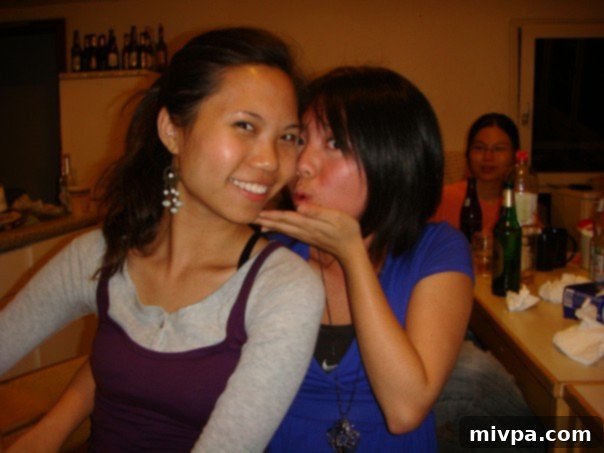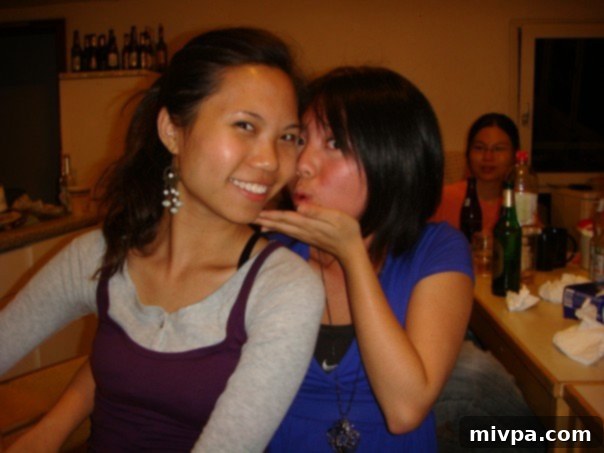Conquering the Kitchen: My Journey from Culinary Disaster to Confident Cook in Germany
I have a confession to make, one that many might find hard to believe now: I used to be an absolute kitchen disaster. This isn’t an exaggeration; it’s a stark reality from my past, particularly vivid when I reflect on my university exchange in Mannheim, Germany. Recalling that period, I marvel at my sheer bravery – or perhaps, naivety – for embarking on an overseas adventure without the faintest idea how to cook. Seriously, how did I ever make it out alive?
The truth is, preparing even basic meals, let alone a varied diet, becomes an insurmountable challenge when you possess zero culinary skills. To say I had “negative knowledge” of how a kitchen operated would still be an understatement. Appliances were alien tools, raw ingredients a confusing array. My relationship with the kitchen was virtually non-existent. It’s almost embarrassing to admit that I couldn’t distinguish between common Chinese vegetables fresh from the supermarket, or many other fundamental ingredients for that matter. The kitchen, in essence, was a foreign land, and I was its most reluctant explorer.
The Culinary Wilderness: My Pre-Exchange Kitchen Phobia
Growing up, I was accustomed to the luxury of food magically appearing in steaming hot dishes, perfectly prepared and ready to eat, whether at home or in restaurants. The intricate “pre-eating process” – the washing, chopping, cooking, and plating – was something I never gave a second thought to. How did raw rice grains transform into creamy, comforting porridge? A mystery. How did cornstarch magically thicken a sauce? Absolutely no idea. What was the nuanced difference between grilling and barbequing? Utterly clueless. My ignorance was profound, and frankly, a little shameful.
Looking back, it’s quite mortifying to confess my utterly undomesticated state. And no, that doesn’t imply I was a wild animal foraging for sustenance! The core issue wasn’t an inability to learn, nor a failure on the part of my Home Economics teacher at Nanyang Girls’ High School. Instead, I simply never cultivated any interest in understanding the kitchen better. This prolonged detachment fostered a deep-seated, almost innate fear of operating any kitchen appliance. The mere thought of igniting a stove or deciphering oven settings was enough to send shivers down my spine. The kitchen represented not a place of creation, but a realm of potential mishaps and overwhelming complexity.
A Leap of Faith into German Kitchens
My arrival in Germany for the exchange program marked a forced confrontation with my culinary shortcomings. Suddenly, there were no ready meals, no family chefs, and no familiar restaurants around every corner. Self-sufficiency became an immediate, pressing reality. This transition was made slightly less daunting by the presence of Faye, a friend from SMU who also became my roommate in Mannheim. We approached our shared kitchen with a mutual, albeit differing, level of apprehension. Faye, thankfully, was a tad braver and more adventurous with her food experiments, making her my unwitting kitchen mentor.
The first challenge, even before cooking, was grocery shopping in a foreign land. Navigating German supermarkets, with their unfamiliar labels and produce, felt like a quest. Identifying ingredients, understanding measurements, and deciphering product names added another layer to my already burgeoning kitchen anxiety. It was Faye who truly introduced me to the rudimentary mechanics of our shared German kitchen, a space that initially felt more like a laboratory for potential disasters than a place for meal preparation. Our early days were filled with tentative explorations, punctuated by small triumphs and, inevitably, a few humorous failures, as we both sought to establish some semblance of culinary order in our student lives.
The Microwave Rice Cooker: My German Kitchen MVP
If you’re of Asian descent or simply appreciate Asian cuisine, you understand the paramount importance of rice in our diet. It’s often the foundational element, the heart of many meals, without which a plate can feel incomplete or lacking. While this might sound like a slight exaggeration, my love for rice in all its forms is genuine. (For fellow rice enthusiasts, I highly recommend checking out this article on rice and the various ways to cook it for some inspiration!) Understanding this deep cultural and personal connection to rice, you can grasp why, armed with our unassuming microwave rice cooker – a treasure Faye had brought from Singapore – we felt an almost invincible sense of readiness to conquer the world, or at least our immediate culinary needs.
This humble appliance was nothing short of a miracle. Witnessing how slender, long grains of rice could transform into bowls of steaming, fluffy white perfection in just 20 minutes inside our German microwave was truly awe-inspiring. I would watch with genuine wonder as the microwave worked its magic, while Faye, with slightly more expertise, showed me a few tricks with a saucepan. Our culinary repertoire began with simple, comforting dishes: stir-fried Chinese Bak Choy (“White Vegetable”) seasoned with soya sauce, minced garlic, and a touch of cornstarch to thicken the sauce; chicken cooked in savory oyster sauce; and on special occasions, fried rice or fried noodles. These were, admittedly, recipes for what we affectionately called “kitchen idiots” – dishes so straightforward that messing them up would indeed imply a complete culinary ineptitude. But for us, they were triumphs, building blocks in our slow, cautious ascent out of kitchen phobia.
Navigating the Maze of Kitchen Fears and Monotony
Despite the minor victories enabled by the microwave rice cooker, my underlying fear of the kitchen persisted, severely limiting my culinary scope. My apprehension wasn’t just vague; it manifested as specific anxieties. I didn’t mesh well with strange cooking appliances – the various knobs and settings on the oven, the unfamiliar gas stove, or even just the proper use of a sharp knife. Moreover, new ingredients, with their unknown textures, smells, and preparation requirements, were equally intimidating. The thought of experimenting with unfamiliar foods, and the potential for creating an inedible mess or even worse, falling ill, was enough to deter me completely.
Consequently, I chose the path of least resistance, opting for the same bland, predictable dishes over and over again. My logic was simple: at least these familiar meals were safe, edible, and guaranteed not to trigger a kitchen catastrophe. Throughout that four-month semester, my diet revolved almost exclusively around stir-fried vegetables, stir-fried chicken, steamed rice, fried rice, fried noodles, fried eggs, and an abundance of pasta. The pasta was the simplest: boiled for 30 minutes, then topped with a heated-up, pre-made canned sauce. This monotonous diet became my comfort zone, albeit a rather uninspired one.
Honestly, my memories of cooking in that shared kitchen barely extend beyond this limited rotation. It’s genuinely a shame to recall the severe lack of dietary variation and a rather horrid thought now that I am no longer so clueless and have thankfully climbed out of the “Kitchen Disaster” category. My palate, accustomed to the vibrant and diverse flavors of home, yearned for more, but my fears kept it firmly in check. The social aspect of food also suffered; I often felt embarrassed to cook for or with others, preferring to stick to my safe, simple routine.
The Aftermath: A Wake-Up Call and a Culinary Transformation
Mercifully, the semester in Mannheim lasted a relatively short four months. Not too long after my return to Singapore, my body began to recover from the lack of a well-balanced diet. The effects of too much student-budget pasta and the constant repetition of the same few dishes had an undeniable, physically manifested impact. I distinctly remember my brother Ronald and my cousin Shawn both urging me to hit the gym immediately upon my return, suggesting I needed to “shake off some of the excess pasta fats.” It was a light-hearted jab, but it served as a wake-up call, highlighting the very real consequences of my culinary neglect.
This experience, coupled with the desire to live a healthier and more enjoyable life, gradually sparked a slow but significant change. While the immediate aftermath of the exchange didn’t see me transform into a gourmet chef overnight, it planted the seeds of curiosity and determination. I started small, experimenting with one new ingredient or one simple technique at a time. The memory of feeling so helpless in the kitchen during my exchange became a powerful motivator. I realized that cooking wasn’t just about survival; it was about self-care, creativity, and exploring new flavors.
From Kitchen Disaster to Confident Cook: My Ongoing Journey
Ah, thank goodness that disastrous period of my kitchen experience is finally over! I might have successfully swept it under the carpet for years, hoping it would never see the light of day again. But now, I’m grateful to finally get it off my chest and air my culinary dirty laundry in public, for all of you to witness my horrific past as a “Kitchen Disaster.” This journey from utter incompetence to a confident, albeit still learning, cook has been incredibly rewarding. It taught me invaluable lessons about resilience, the importance of basic life skills, and the joy of creating something with your own hands.
My Mannheim exchange was more than just an academic experience; it was a crucible that forged a new relationship with food and the kitchen. What began as a terrifying necessity blossomed into a genuine interest. I’ve learned that overcoming a fear, no matter how trivial it seems, can open doors to unexpected personal growth. For anyone out there who identifies with my past self, feeling intimidated by the kitchen, know that it’s never too late to start. Take small steps, embrace the microwave rice cooker if you must, and celebrate every tiny culinary triumph. The journey from “kitchen disaster” to “confident cook” is a testament to perseverance, and a delicious one at that.
This is Faye and I in our Mannheim kitchen in 2007, oblivious to our fears, yet on the cusp of a culinary awakening!

